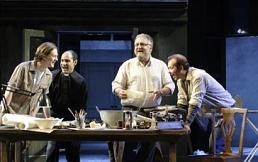Life of Galileo Review
The Olivier Theatre at the National is a rather cavernous auditorium. Without a proscenium arch, it has some of the qualities of outer space, particularly when the house lights are dimmed. So Bunnie Christie's excellent set, shaped like an observatory, almost positions the audience above the action of this play like aliens from another galaxy, gazing down on Earth and observing wretched humans going about their business.
And the business in hand here is that of discovering truth or, more particularly, describing the truth about the mechanics of our solar system. Because the general view in the early 17th century (the period in which this play is set) was that the earth was at the centre of the universe with the other stars and planets revolving around it in glass spheres which had fixed positions. Copernicus had already expounded the idea (resurrected from earlier times) that our solar system was heliocentric (ie with the sun at its centre) rather than geocentric (with the Earth at its centre). However, the Roman Catholic Church supported the geocentric theory since it placed man and earth at the centre of things with heaven above, and, as Galileo was to discover, the Church was at considerable pains to ensure its preferred view persisted.
We step into Galileo's life as his brilliant mind is focused on a trivial and mundane matter - paying the milk bill. Somewhat impecunious, Galileo is forced to take on fee-paying pupils and attempts to squeeze a higher salary from his university employers. But even in the 17th century, it seems university professors were expected to pay for their keep by inventing saleable technology. "Knowledge is a commodity", says the University Chancellor, "do not despise the market".
So Galileo purloins a Dutch invention - the telescope - enhances it, and duly hands it over to the university authorities in return for a higher salary. But the telescopic innovation has an added bonus for Galileo because it enables him to observe the moons of Jupiter and to prove the heliocentric theory of the universe - something which Copernicus had not done. Risking the antagonism of the Church, Galileo is convinced that 'reason' will prevail. Although the Papal Astronomer duly confirms Galileo's observations, he's nonetheless prohibited from publishing his discovery, and it's not until a new Pope - a scientist - is enthroned that Galileo becomes confident enough to recommence his work on planetary movement, but his hopes are dashed when he's subjected to Papal Inquisition and 'shown the instruments'.
Fine support abounds in this exceptional production directed by Howard Davies and adapted by David Hare from Bertolt Brecht's play (first performed in 1943). Oliver Ford Davies provides an almost matter-of-fact Cardinal Inquisitor who, though at times pleasantly sociable and almost charming, is nevertheless a powerful force to be reckoned with and manages to unnerve, if not actually terrify us. Bryan Dick, as Andrea Sarti, is an exuberantly determined pupil, and Andrew Woodall's scientist Pope ably portrays intellectual reason swayed by political expediency and dogma. Countertenor, Charlie Tighe, provided some haunting solo singing, and Mark Henderson's evocative and subtle lighting design also deserves special mention.
Brecht's 'The Life of Galileo' gives us an insight into the struggles of a genius, and has significant modern relevance in terms of the responsibilities of both scientists and politicians alike. And on top of all that, it's a damn fine piece of drama.
What the popular press had to say.....
NICHOLAS DE JONGH for THE EVENING STANDARD says, "Spectacular production." PAUL TAYLOR for THE INDEPENDENT says, "Urgent, bitingly funny and morally devastating modern-dress production...Simon Russell Beale's brilliant performance " CHARLES SPENCER for THE DAILY TELEGRAPH says, "Superb production." BENEDICT NIGHTINGALE for THE TIMES says, "Sharp, actable adaptation." MICHAEL BILLINGTON for THE GUARDIAN says, "Howard Davies has put the production into modern dress with surprising, often illuminating results." JOHN THAXTER for THE STAGE says, " He [Simon Russell Beale] triumphs in the central role."
External links to full reviews from popular press
Independent
Guardian
Daily Telegraph
The Times
Production photos by Catherine Ashmore
Originally published on
